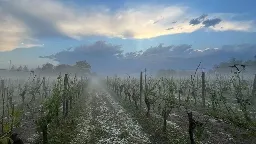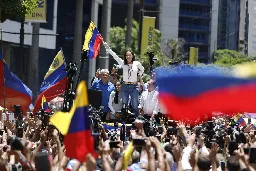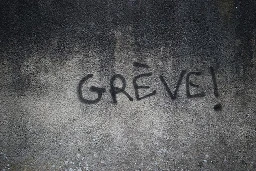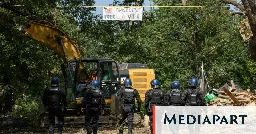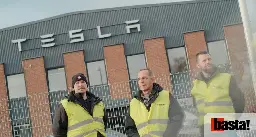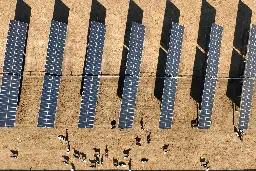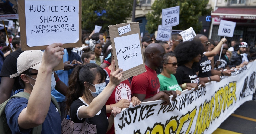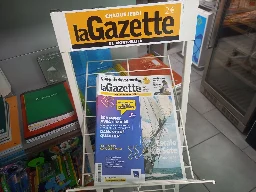 le_pouffre_bleu @ le_pouffre_bleu @slrpnk.net Posts 136Comments 29Joined 2 yr. ago
le_pouffre_bleu @ le_pouffre_bleu @slrpnk.net Posts 136Comments 29Joined 2 yr. ago

Bravo, tu m'as fait replonger en 68 coups :D
Ça m'a rappelé qu'en 2022 j'avais lu des articles (probablement sur lundi matin et/ou rapports de force) qui comparaient le projet politique de Zelensky avec celui de Macron et la position difficile des syndicalistes ukrainiens qui voulaient participer à l'effort de guerre tout en défendant les droits, ils sembleraient qu'ils aient perdu sur ce dernier front...
Toutes choses égales par ailleurs, j'ai du mal à ne pas faire de parallèle nombriliste avec notre situation où la continuation de la destruction de notre modèle sociale et de l'etat de droit déjà planifiée par Macron&cie va utiliser le prétexte du soutien nécessaire à l'Ukraine contre la Russie pour nous réprimer encore plus durement... D'autant qu'avec la loi de programmation militaire 2024-2030 passée en aout 2023, 3 mois après que la justice a déclaré illégales les réquisitions de travailleurs en grève de la plus grande raffinerie du pays, a modifié "inutilement" les conditions pour recourir à des réquisitions en élargissant les champs d'application avec des termes flous ouvrant la voie à des interprétations arbitraires, il y a de quoi attiser mes craintes pour la survie de nos libertés.
J'ai pas fait les rêves les plus agréables cette nuit :(
J'ai plongé dans les tréfonds de mon humanité pour le trouver au bout du 185 coups...
Une pause s'impose
Face à la nouvelle donne géopolitique, les syndicats ne veulent pas lâcher les travailleurs ukrainiens
Tu peux y ajouter la place qu'ils accordent aux climatoscepticisme/relativisme notamment avec Luc Ferry
J'ai toujours pas trouver comment désactiver la traduction automatiques des titres... La traduction audio peut se désactiver, rassure moi.
Comment transformer une usine automobile en coopérative écolo : des ouvriers montrent la voie
#SUTOM #1143 4/6
🟥🟥🟦🟦🟥🟥🟡🟦🟦 🟥🟥🟡🟡🟦🟦🟦🟥🟦 🟥🟥🟥🟦🟦🟡🟡🟦🟦 🟥🟥🟥🟥🟥🟥🟥🟥🟥
J'en profite pour partager ma petite victoire personnelle J'ai trouvé #cemantix nº1089 en 39 coups ! 🥳 🥵 😎8️⃣ 🥶🥶2️⃣4️⃣ 🧊5️⃣ https://cemantix.certitudes.org/
Hier j'ai trouver en 69 coups, deux réussites d'affilée alors que j'ai pour habitude de pas trouver !
Il y a quand même une différence dans la forme, le RN essaie encore de séduire à la fois les "français populaire et éternels" tout en présentant bien pour la bourgeoisie à la fois sur la forme avec des cravates et en essayant de prétendre respecter les institutions (institutions qui ne sont pas fondamentalement incompatibles avec leur projet autoritaire mais c'est un autre sujet) alors que le trumpisme est frontalement dans un discours anti élite populiste parce qu'il n'y pas les même dominants avec la même fétichisation pour l'ordre sous forme policées. Là où ils se rapprochent du trumpisme je trouve c'est dans l'aveuglement fanatique de leur base qui est entrain de se solidifier leur permettant de faire le contraire de ce qu'ils disent sans conséquence et même pire en se faisant défendre par celleux qui désire croire ce qu'ils disent.
C'est l'ensemble de la société qui se trumpise. Le RN n'a pas à beaucoup forcer pour que ça aille dans son sens et en récolter les bénéfices.
Je pense que voir le RN comme un moteur de la trumpisation est une erreur, c'est tout une partie de système politico-médiatique qui poussent dans ce sens avec en tête Macron et les LR qui s'attaquent dans les discours et les actes à nos libertés fondamentales, à notre contrat social et non conditions matérielles d'existence, à l'Etat de droit et sont les vrais artisans de la destruction de langage qui pourrait nous permettre de mieux rêver et s'organiser pour de meilleure lendemain sans oublier de la banalisation de la post-vérité, de la corruption et des mensonges sans conséquences...
«On veut se réapproprier l’énergie» : près de Nantes, le premier fournisseur associatif d’électricité renouvelable turbine
Cool de revenir et voir une tête familière ;)
J'ai déjà une palanquée de jeux en stock que j'ai jamais lancé, en y ajoutant cela je vais encore être plus perdu pour savoir quoi lancer quand j'aurais plus de temps :D
Un neutrino de très haute énergie détecté en Méditerranée grâce à un à un télescope sous-marin
Climat : à Carpentras, les viticulteurs tentent de contrôler la grêle en ensemençant les nuages // manipuler les nuages, une technologie controversée
Budget 2025 : le projet de Gabriel Attal prévoit de nouvelles coupes pour la transition écologique
Ça m'a fait pensé à ça, comme actualisation : https://www.ladn.eu/nouveaux-usages/dix-ans-plus-tard-les-hipsters-sont-devenus-conservateurs/
Attention: la tendance à singer Super Dupont ne doit pas être confondue avec le Made in France.
Camus@jlai.lu tu sais ce qu'il te reste à faire !
L’Australie approuve les plans de construction de la « plus grande » centrale solaire du monde
Forêts : « En faisant de la plantation d’arbres la règle, Emmanuel Macron a fait le choix d’une politique soutenant les pratiques les plus controversées »
Sylvain Angerand, Ingénieur forestier
Dans une tribune au « Monde », le coordinateur de l’association Canopée, Sylvain Angerand, appelle à revoir le volet forestier du plan France Relance, dont il évalue négativement l’impact sur la biodiversité et les puits de carbone.
Dans l’inconscient collectif, planter un arbre est un symbole d’action écologique. En annonçant vouloir planter 1 milliard d’arbres en dix ans pour « renouveler » les forêts françaises, le président de la République a voulu marquer les esprits. Mais une forêt ne se gère pas en plantant des arbres. Au contraire, en faisant de la plantation la règle, Emmanuel Macron a fait le choix d’une politique forestière soutenant les pratiques les plus controversées au détriment de l’émergence d’une sylviculture plus durable basée sur les dynamiques naturelles et la résilience.
Le premier constat est que, dans plus de 85 % des projets financés, la forêt a été rasée avant d’être replantée. Parfois, malheureusement, ces coupes rases sont nécessaires. Mais les critères de sélection des projets sont si flous que les abus ont été et sont encore nombreux. Il suffit qu’une forêt comporte 20 % d’arbres dépérissants pour qu’elle puisse être qualifiée de sinistrée ou vulnérable. En conséquence, même si 80 % des arbres sont vivants, elle peut être rasée et replantée. Le plus souvent avec des résineux, plus recherchés par l’industrie.
Ethique de médecine
Cette politique est en contradiction, de plus en plus flagrante, avec le droit européen. Aucune évaluation environnementale n’a été réalisée, alors que les impacts sur la biodiversité ou le puits de carbone sont significatifs.
En détruisant de façon volontaire des stocks de carbone, le gouvernement prend le risque de ne pas respecter son objectif d’absorption de carbone dans le secteur des terres à l’horizon 2030 et de s’exposer à une très forte amende.
Dernière réalité, cette politique de plantation est très gourmande en fonds publics. Le volet forestier du plan de relance a coûté environ 150 millions d’euros pour « renouveler » environ 36 000 hectares de forêt, soit un investissement public de 4 145 euros par hectare.
Malgré ce fort niveau de dépenses, de nombreuses forêts, notamment des forêts publiques dans le Grand-Est, n’ont pas pu être reconstituées. Certains acteurs de la forêt privés ont, en effet, capté ces aides pour financer des projets « ne relevant pas directement de l’adaptation des forêts au changement climatique » , comme le souligne la Cour des comptes.
Nous proposons donc une approche différente : concentrer les moyens lourds (coupe rase et plantation sur la totalité de la surface) pour des situations exceptionnelles et adopter une logique plus douce et moins coûteuse ailleurs. Autrement dit, établir une éthique de médecine pour la forêt : réduire les facteurs de vulnérabilité, détecter de façon précoce les problèmes, soigner de façon ciblée et amputer seulement lorsqu’il n’y a plus d’autre choix.
La clé de voûte de cette stratégie est d’adopter un plan pour promouvoir la sylviculture mélangée à couvert continu gestion à travers laquelle la forêt est maintenue dans sa structure naturelle, entretenue par des coupes de bois légères, et qui favorise le mélange d’essences partout où cela est possible.
Plutôt que de focaliser le débat sur ce qu’il faut planter, il s’agit de se concentrer sur l’amélioration et l’enrichissement de l’existant par des travaux plus ciblés, moins intensifs mais plus fréquents. Objectif : renforcer progressivement la résistance et la résilience des forêts en restaurant un bon état de fonctionnement écologique. Une stratégie parfaitement alignée avec l’agenda européen.
Avec un forfait ou un crédit d’impôt de 500 euros par hectare pour réaliser des travaux d’amélioration (éclaircie légère, petite plantation d’enrichissement, ouverture de cloisonnement), cela permettrait de traiter une plus grande surface de forêt. Une stratégie qui monte en puissance en Allemagne. Lors de la précédente législature, deux propositions de loi, portées par des députés de différents partis politiques, ont été bloquées par le ministère chargé de l’agriculture et des forêts.
Notre politique forestière ne doit plus se résumer à un slogan de communication sur un nombre d’arbres plantés. La nouvelle donne à l’Assemblée nationale est une occasion pour enfin ouvrir un large débat transpartisan sur l’avenir de nos forêts.
"Oui aux contournements routiers de Montpellier" : quand La Gazette sert (encore) de passe-plats à la bourgeoisie locale
Merci beaucoup, je n'ai malheureusement pas le temps d'y réagir longtemps (en plus d'avoir appuyer malencontreusement sur annuler après avoir finit le premier message)
Je réagirait juste propos de ça :
Le 2e a l’air de juste parler du marketing de la silicon valley, ça m’intéresse pas. Je suis anticapitaliste, qu’ils mangent leurs morts. Les startups d’IAs sont des boites capitalistes comme les autres, je le sais, je m’en fous, y a aucun sujet spécifique à l’IA là.
Camarade, ce ne sont pas nos imaginaires et récits qui donne l'orientation du déploiement à grande échelle de ces technologies, c'est bien le récit capitaliste et son marketing. Des personnes comme toi qui cherchent à faire émerger une autre voie sont indispensables mais il me semble assez candide de croire qu'une partie de de cette démarche et assimilé par les boites de la silicone vallée (Internet pour tous ausi à ses début on parait d'utopie) et que l'essor de l'usage de ces techno puisse être diviser en fonction des intentions des personnes qui ont bosser en premier leur dessus. Surtout que ces marketing narratifs est aussi partagé et défendu par nos dirigeants politiques, même si pas forcément partagé par une partie du personnel administratif, ce qui fait que ce contester de ce que veux (ex : le rêve mouillé de surveillance dystopique qui est en train de se réaliser) va de le sens d'un partenariat avec ces grandes boites et rien ne dis que si un stop leur mis les États ne se réappropriation pas les mêmes usages...
. (hésite pas à me dire si je suis passé trop vite sur un argument important de l’article pas évoqué dans l’intro)
Je dirai que tu te place une ouillière que te fais voir avec plus de difficulté les arguments développé justement.
on en est là, à devoir démonter des idées fausses assemblées pour assouvir le besoin de pessimisme d’une population généralement technophobe, car confondant progrès technologique et silicon valley. Ce qui, soit dit en guise de conclusion, est une des plus grandes impostures intellectuelles de ce siècle.
Je ne suis pas certain que parler de technophobe soit approprier, on peut critiquer ou être opposé à l'utilisation et au développement d'une techno sans pour autant être technophobe, un bon exemple c'est nucléairepunk vs solarpunk. Pour moi la plus grande imposture c'est plutôt la confusion entre progrès technologique et progrès humain et dissocier les implications sociaux-politiques et environnementales de la recherche en science appliqué.
Oui les progrès de l'IA pour la médecine et la pharmacologie sont incroyables et merveilleux (presque magique en vrai dans ce que ça permet ;) )mais si les gains offert par ces progrès sont indissociables du développement et déploiement de technologie qu'Orwell ne pouvait même imaginer est-ce qu'on peut toujours parler de progrès technologiques enviable, e dis ça parce que souvent quand on parle bénéficie/risque des IAs dans les médias (je pense en particulier à une émission radiofrance) on a souvent droit à un association des deux sans chercher à distinguer les critiques pour chaque domaine.
J'ai réécrit à la va vite, je suis un peu frustré le premier message était mieux formulé j'espère que celui-ci est quand même compréhensible
Je suis curieux d'avoir tes retours sur ces articles : https://www.arretsurimages.net/chroniques/clic-gauche/le-data-center-va-manger-le-monde
https://www.arretsurimages.net/chroniques/clic-gauche/le-futur-nexiste-pas
:)
La trêve olympique interroge aussi à Milan, dans la rédaction du Corriere della Sera. Malgré la période compliquée que traverse le pays, aux niveaux aussi bien politique qu'économique, Paris 2024 pourrait faire souffler un vent nouveau sur l'Hexagone ? Le quotidien centriste en doute :
"Si jamais les choses tournent mal, ce sera la faute de Macron. Si au contraire tout va bien, ce sera malgré lui. Le président est impopulaire auprès de la majorité des Français pour deux raisons : il ne fait rien pour cacher son talent ; il tient un discours positif et optimiste sur la France et l'Europe. Une faute impardonnable dans ce pays où prospèrent, et pas seulement sur le plan politique, ceux selon lesquels tout va mal et tout ira de mal en pis."
Magnifique.
So what does is change about the facts in this article? If know about her, I guess you known about the social cleansing that happened in Paris, so why just focus on her instead of the subject ?
she does more hurt to her community than anything.
Funny enough, this critic is mostly made from people outside "her community"...
What's wrong ?


